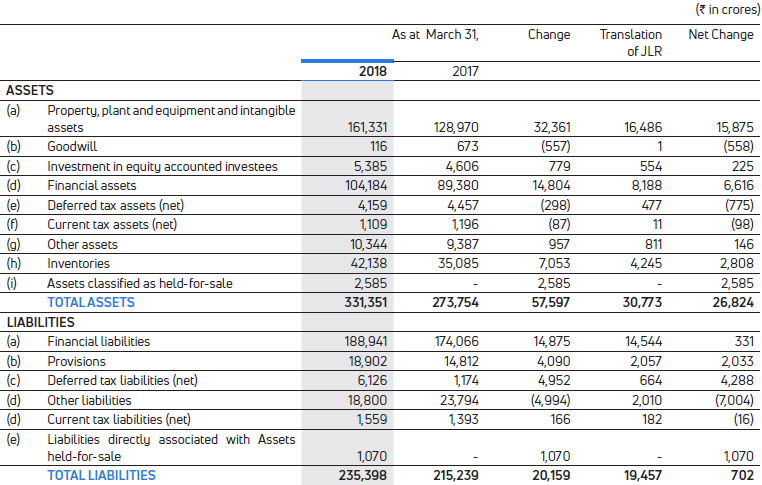Results of Operations
Revenue from operations of the Company for Fiscal 2018, stood at Rs. 295, 409.34 crores, as compared to Rs. 274,492.12 crores, increased by 7.6%. Total number of vehicles sold were 12,21,124 units in Fiscal 2018 as compared to 10,91,748 units in Fiscal 2017, a growth of 11.9%. Revenue from operations (net of excise duty) stood at Rs. 294, 242.57 crores as compared to Rs. 269,849.66 crores, increase of 9.0%.
The following table sets forth selected items from the Company’s consolidated statements of income for the periods indicated andshows these items as a percentage of total revenues:
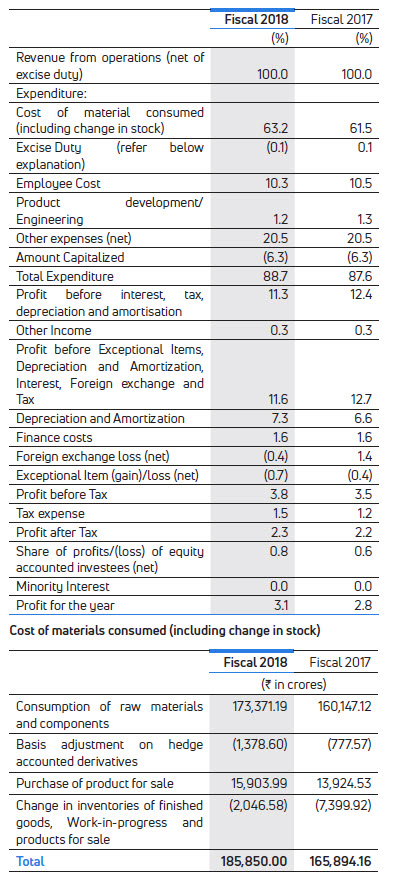
Cost of material consumed increased to 63.2% of total revenue (excluding income from vehicle financing) in Fiscal 2018 from 61.5% in Fiscal 2017. For Tata Motors Standalone (including Joint Operations), costs of materials consumed was 73.0% of net revenue in Fiscal 2018 of total revenue as compared to 70.5% in Fiscal 2017, representing an increase of 250 bps, which was mainly attributable to a change in product mix. For Jaguar Land Rover, costs of materials consumed was 65.9% of total revenue in Fiscal 2018 compared to 66.3% in Fiscal 2017, representing a decrease of 40 bps, mainly driven by product mix.
Excise duty for the Fiscal 2018 represents the reversal of excise duty on closing inventories as at July 1, 2017. Consequent to the introduction of Goods and Service Tax (GST) with effect from July 1, 2017, Central Excise, Value Added Tax (VAT) etc have been replaced by GST. Excise duty for Fiscal 2018 was Rs.790.16 crores as compared to Rs.4,799.61 crores in Fiscal 2017. Of this recovery from sales was Rs.1,166.77 crores for Fiscal 2018 as compared to Rs.4,642.46 crores for Fiscal 2017. The same has been netted off in the discussion under this section against Revenue from operations to be comparable.
Employee Costs were Rs.30,300.09 crores in Fiscal 2018 as compared to Rs.28,332.89 crores in Fiscal 2017, an increase of 6.9%. There was favourable translation impact of GB£ to INR of Jaguar Land Rover operation of Rs.462.49 crores. At Jaguar Land Rover the increase in employee cost is by 9.3% to GB£ 2,726 million (Rs.23,392.69 crores) in Fiscal 2018 as compared to GBP 2,495 million (Rs.21,829.15 crores) in Fiscal 2017, primarily reflects the increase in the employee head count all across functions and impact of consolidating Spark 44 since August 31, 2017. For Tata Motors Standalone (including joint operations), the employee cost increased by 5.4% to Rs.3,966.73 crores as compared to Rs.3,764.35 crores in Fiscal 2017, mainly due to annual increments, higher performance payment accruals and wage revisions. Employee costs at TDCV were Rs.828.65 crores in Fiscal 2018, as compared to Rs.775.83 crores in Fiscal 2017, an increase of 6.8%, due to annual increments.
Other Expenses includes all works operations, indirect manufacturing expenses, freight cost, fixed marketing costs and other administrative costs. These expenses have increased to Rs.60,184.21 crores in Fiscal 2018 from Rs.55,430.06 crores in Fiscal 2017. The breakdown is provided below:
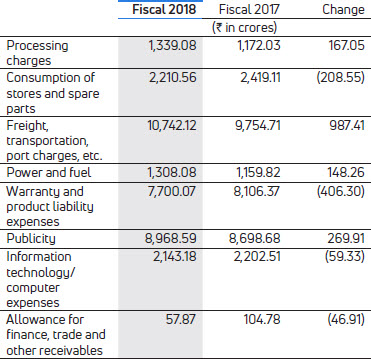
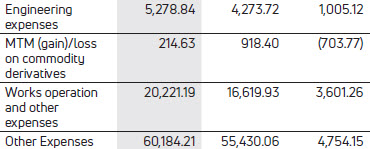
The changes are mainly driven by volumes and the size of operations.
- Processing charges were mainly incurred by Tata and other brand vehicles (including vehicle financing) which, due to higher volumes, led to higher expenditures.
- Freight, transportation, port charges etc. have increased, for Jaguar Land Rover, predominantly due to increased sales in certain geographies and for India business due to increased volumes. As a percentage to total revenue, Freight, transportation and port charges etc. were flat at 3.6% in Fiscal 2018.
- Publicity expenses increased by 3.1% mainly due to increase in JLR and represented 3.0% of total revenues in Fiscal 2018 and 3.2% in Fiscal 2017. In addition to routine product and brand campaigns, the Company incurred expenses relating to new product introduction campaigns for the I-Pace, E-Pace, Velar and the all new Jaguar XF, the Nexon at Tata Motors. Further, during the year the amount was spent on certain Auto / Motor shows, viz. Delhi Auto expo, Geneva Motor show etc.
- Warranty and product liability expenses represented 2.6% and 2.9% of the Company’s revenues in Fiscal 2018 and 2017, respectively. The warranty expenses at Jaguar Land Rover represented 2.6% of the revenue as compared to 2.9% last year, whereas Tata Motors India operations these represent 1.3% and 1% of revenue for Fiscal 2018 and 2017, respectively.
- Works operation and other expenses have increased to 6.9% of net revenue in Fiscal 2018 from 6.4% in Fiscal 2017.
- Engineering expenses at Jaguar Land Rover have increased, reflecting its increased investment in the development of new vehicles. A significant portion of these costs are capitalized and shown under the line item “Amount capitalized”.
- The provision of various debtors, vehicle loans and advances (net), has decreased to Rs.57.87 crores in Fiscal 2018 as compared to Rs.104.78 crores in Fiscal 2017, mainly reflect provisions for finance receivables, where the collections have improved in Fiscal 2018. Further there is reversal of certain provisions in Trade receivables due to favourable litigation awards.
Amount capitalized represents expenditure transferred to capital and other accounts allocated out of employee cost and other expenses, incurred in connection with product development projects and other capital items. The expenditure transferred to capital and other accounts has increased by 10.1% to Rs.18,588.09 crores in Fiscal 2018 from Rs.16,876.96 crores in Fiscal 2017, mainly due to various product development projects undertaken by the Company for the introduction of new products and the development of engine and products variants.
Other Income increased by 17.8% to Rs.888.89 crores in Fiscal 2018 from Rs.754.54 crores in Fiscal 2017. Interest income increased to Rs.711.81 crores in Fiscal 2018, compared to Rs.562.21 crores in Fiscal 2017, whereas profit on sale of investment decreased to Rs.129.26 crores in Fiscal 2018, compared to Rs.176.14 crores in Fiscal 2017, primarily on the sale of mutual funds, at Tata and other brand vehicles (including vehicle financing).
Profit before Interest, Depreciation, Foreign Exchange (gain)/ loss, Exceptional Items and Tax is Rs.37,761.86 crores in Fiscal 2018, representing 12.8% of revenue in Fiscal 2018 compared to Rs.37,666.90 crores in Fiscal 2017.
Depreciation and Amortization: During Fiscal 2018, expenditures increased by 20.4% to Rs.21,553.59 crores from Rs.17,904.99 crores in Fiscal 2017. The depreciation has increased by 20.2% to Rs.10,874.34 crores as compared to Rs.9,048.63 crores in Fiscal 2017 and is due to new product launches both at Jaguar Land Rover and Tata andother brand vehicles (including vehicle financing). The amortization expenses have also increased by 20.6% to Rs.10,679.25 croresin Fiscal 2018 from Rs.8,856.37 crores in Fiscal 2017, and areattributable to new products introduced during the year.
Expenditure on product development / engineering expenses charged off increased by 3.5% to Rs.3,531.87 crores in Fiscal 2018 from Rs.3,413.57 crores in Fiscal 2017.
Finance Cost increased by 10.5% to Rs.4,681.79 crores in Fiscal 2018 from Rs.4,238.01 crores in Fiscal 2017. The increase was mainly due to increased borrowing & interest rates.
Foreign exchange gain of Rs.1,185.28 crores in Fiscal 2018 as compared to a loss of Rs.3,910.10 crores in Fiscal 2017. The gain was mainly due to appreciation of GBP as compared to USD.
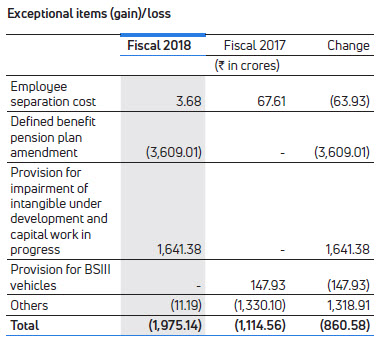
- The credit of Rs.3,609.01 crores (GB£ 437 million) during the Fiscal 2018, relates to the amendment of the Defined Benefit scheme of Jaguar Land Rover Automotive Plc.
- There has been significant disruptions in the Auto industry necessitating a review of the Company’s product development cost capitalization policy. The new capitalization gateway introduced the factor “affordability” of investments w.e.f April 1, 2018. Thus the Company reviewed its tangible and intangible assets to ensure “fit for future” and taken a charge of Rs.1,641.38 crores in Fiscal 2018.
Earnings Before Interest Tax (EBIT) increased to Rs.13,478 crores in Fiscal 2018, compared to Rs.11,846 crores in Fiscal 2017. EBIT is defined to include the revaluation of current assets and liabilities and realized foreign exchange and commodity hedges as well as profits from equity accounted investees but excludes the revaluation of foreign currency debt, mark to market (MTM) on foreign exchange and commodity hedges, other income and exceptional items.
Consolidated Profit Before Tax (PBT) increased to Rs.11,155.03 crores in Fiscal 2018, compared to Rs.9,314.79 crores in Fiscal 2017. The increase in PBT is primarily driven by improvement in the Tata Motors Ltd Standalone business in India, mainly favourable model mix and better management of other operating costs. The increase in PBT was also due to exceptional gain of Rs.3,609.01 crores of pension cost. However, the profitability at Jaguar Land Rover operations were lower due to product mix, higher manufacturing expenses and other operating costs including higher marketing expenses, higher depreciation and amortization expenses related to significant capital expenditure incurred in prior periods. In Fiscal 2017 there were exceptional credit of Rs.1,330.10 crores, which relates to receipt of insurance proceeds, recovery of import duties and taxes for the explosion at the port of Tianjin (China) in August 2015. Further, there was a decrease due to translation impact from GB£ to INR of Rs.273 crores.
Tax Expense represents a net charge of Rs.4,341.93 crores in Fiscal 2018, as compared to Rs.3,251.23 crores in Fiscal 2017. The effective tax rate in Fiscal 2018 was 32.3% as compared to 30.0% in Fiscal 2017 (PBT includes share of profit of Joint Venture and associates). For Tata Motors Ltd and certain subsidiaries, the Company has not recognized deferred tax assets due to uncertainty of future taxable profits. In Fiscal 2018, there was a reduction in the US Federal rate from 35% to 21% and in the UK Corporation tax from 19% to 17% resulting in a deferred tax charge.
Consolidated Profit after tax increased by 20.6% to Rs.8,988.91 crores in Fiscal 2018 from Rs.7,454.36 crores in Fiscal 2017, after considering the profit from associate companies and shares of minority investees. The increase was mainly attributable to improvement in Company’s standalone business and credit of pension plan amendment, China Joint Venture performance offset by provision for impairment of certain assets and JLR performance.
Consolidated Balance Sheet
